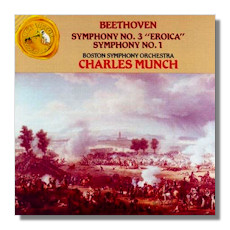
The Internet's Premier Classical Music Source
Related Links
- Beethoven Reviews
- Latest Reviews
- More Reviews
-
By Composer
-
Collections
DVD & Blu-ray
Books
Concert Reviews
Articles/Interviews
Software
Audio
Search Amazon
Recommended Links
Site News
 CD Review
CD Review
Ludwig van Beethoven

- Overture "Fidelio", Op. 72b
- Symphony #1, Op. 21 *
- Symphony #3 "Eroica", Op. 55
Boston Symphony Orchestra/Charles Munch
RCA Victor Gold Seal 38425 *Monaural
I have never understood why the legacy of Charles Munch is not better appreciated in this country. He did amazing work with the Boston Symphony Orchestra, and while his French masterpieces are well documented, his work in the Classical and Romantic periods has been largely forgotten. RCA's two "Romantic Masterwork" boxes have finally restored many great recordings to active circulation, but if you want the best of his Beethoven, these Japanese issues via ArkivMusic are the only way to go.
Right now, Munch's Beethoven 5th (beautiful, but ordinary), 6th (lovely, but without any repeats), and 9th (fierce, thrilling, and badly recorded) are available in the domestic market. That leaves his recordings of the 1st, 3rd, 7th, and 8th. This disc contains a masterful "Eroica", a whiplash "Fidelio" Overture, and a fine (albeit monophonic) 1st. The Boston Symphony is on absolutely stunning form, and Munch is exciting as they come. In the "Eroica", the approach is lean and driven, with the outer movements especially explosive. There are some funny sounds following the end of each movement; I'm not sure why they weren't edited by Japanese RCA, but otherwise the sound is very much in the realm of "Living Stereo". The Overture is equally engaging.
The 1st Symphony was recorded in 1950 and the sound is very full, but a little harsh in the upper registers. Still, it's fine enough that we know what's going on, and that's a good thing. This is a terrific reading, vigorous and exciting. Munch drives his Boston forces hard, and you can already hear the impact he was making at this early date. The woodwinds (which would soon be some of the most luminous in the nation) are on point here. The demand for mono Beethoven is admittedly thin, but I see no reason not to recommend this important part of the Munch/Boston discography. The notes are in Japanese only, but the packaging is cool. Purchase this from ArkivMusic for a slice of history.
Copyright © 2014, Brian Wigman



















